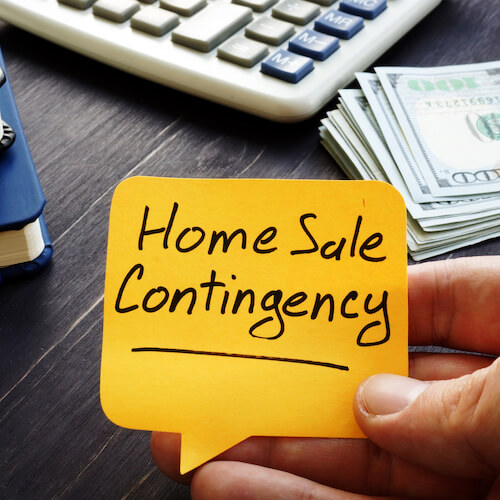Selling and Buying a Home at the Same Time – FAQs

Selling a home while buying another home at the same time can be challenging. If you are thinking about doing this, you probably have questions. So, we’ve gathered together a list of frequently asked questions to help you through the decision-making process.
What are the pros and cons of selling a home with a contingent offer?
Cons: If you accept a contingent offer, there’s no guarantee that the buyer’s home will sell quickly. As a result, if you need to sell your home within a certain time frame, it’s essential to specify a timeline in the contingency agreement. This gives you an out if their selling process drags on.
Pros: If your house has been on the market for a while, a contingent offer might be a better option than no offer. But what if another offer comes in while the contingent offer is in place? This can happen. To prepare for this type of scenario, be sure to include a “bump” clause. As part of the contract, include language that specifies a time frame for the first buyer to decide whether they still want to pursue the contract. This requires the buyer to respond. If the buyer does not respond, you can legally back out of the contract and pursue the new offer.
What are the pros and cons of buying a home with a contingent offer?
Cons: A contingent offer doesn’t mean as much in a popular market such as Bainbridge Island. Multiple buyers with multiple offers can be common. As a result, it might be harder to get a seller to agree to a contingency offer. Also, you may be competing with buyers who don’t need to sell their home before buying, making a contingent offer impractical. If you really want to purchase a particular property, you may have to make an offer outright.
Pros: If you are able to place a home sale contingent offer, this allows you to smoothly transition between houses. You won’t have to worry about renting a temporary place or placing your belongings in storage. Once your home is sold, another one will be ready and waiting for you.
If you have more questions about contingency offers, we’ve compiled more detailed information for you.
Do I buy or sell first?
This is a great question because there are pros and cons to both. Even if you intend to do both simultaneously, you will most likely have to begin one before the other.
Selling first: Starting the selling process first sets you up for greater success in buying a new home. If you sell your home, you’ll have more cash available, which increases your buying power and your down payment. It’s also nice to pay off your first mortgage through the sale before taking on a new one. However, the downside to selling first is that you don’t have a new place to move into. This is a common scenario when selling and buying a home since the timing rarely aligns perfectly. If you do find yourself in this position, one option is to negotiate a rent-back agreement with the buyer. This will allow you to rent the house temporarily and give you more time to find your new home.
Buying first: Buying a new home before selling makes moving a lot simpler. There’s no need to find temporary housing. Instead, you can pack up and move everything to the new place. Making the decision to buy first really comes down to your finances. Having two mortgages means taking on more debt, which can impact your loan terms for the new house. Also, if you haven’t sold your home first, it might be challenging to arrange enough money for a down payment. Without a down payment of twenty percent, obtaining private mortgage insurance (PMI) may be necessary. Lastly, the decision to buy first is based on the assumption that your current house will sell relatively quickly. This is a safe assumption in the Bainbridge Island market, but not a guarantee.
Ultimately, the decision to sell or buy first depends on your situation and what works best for you.
Do I really need to stage my house?
The simple answer is yes. While staging your home may seem like a daunting task, it’s worth the effort and investment. Overall, staged homes typically sell faster and for more money – a double win! Also, a big part of the selling process takes place online. This is where most buyers will see your home first. A staged home better lends itself to eye-catching photos and great first impressions. When potential buyers see your home online, you want them to be able to imagine themselves living there. Staging is the best way to do this and helps interested buyers take the next step. Even partially staging your home can be incredibly beneficial.
Is now a good time to buy and sell?
Based on what we’re seeing in the Bainbridge Island market, we think the answer is yes. The average sale price here in Q1 was $1.6M – and that’s the slow season. Bainbridge’s housing market is heating up and a great real estate agent can help you achieve your goals. Here at Windermere Bainbridge Island, our local agents are highly rated, know our market, and can effectively negotiate on your behalf. Contact us today, and we’ll help you get started.
Home Sellers’ FAQs: Inspections, Contingencies, and More

Thinking of selling your home? Home sellers deal with appraisals, inspections, contingencies, staging, and more. We answer your most frequently asked questions below.
What is a Comparative Market Analysis?
A Comparative Market Analysis or CMA is a detailed report that estimates the value of your home based on the sale of similar properties in your area. Typically, the seller’s agent completes the report after inspecting your home and researching other similar properties near yours. They will also take into account regional market trends.
One of our local real estate experts can provide a free analysis. Knowing this information will allow you to make informed decisions moving forward. It can also aid in determining what remodels or potential upgrades would be worth it to make before putting your home on the market.
How is an appraisal different from a CMA?
An appraisal of your home will occur further along in the home-selling process. Once a buyer makes an offer, their lender will require an appraisal for financing purposes. It ensures that the bank does not lend the buyer more money than the property is worth. Typically, the home buyer will pay for the appraisal.
Is a pre-listing inspection worth it?
While a Comparative Market Analysis will identify the value of your home, a pre-listing inspection can take place before the home is put on the market to ensure it is ready to list. A home inspector examines the property and identifies any repairs or problems that may need to be addressed. Pre-listing inspections also allow the seller to address and avoid any surprises that might scare off a home buyer. Additionally, they help instill a sense of trust so that the buyer knows more about the property upfront and feels more confident about it.
If the pre-listing inspection uncovers any major repairs that need to be completed prior to selling the property, the Windermere Ready Program is a loan program that can help sellers with the upfront costs. It provides a loan specifically for repairs and upgrades to a property and can enhance your home with the goal of it selling for more and in less time.
What types of contingencies will I face?
Once a buyer puts in an offer, it is common for the offer to come with contingencies. Five of the most common contingencies in a home sale are home inspection, financing, appraisal, home sale, and title contingencies.
These contingencies protect the buyers’ interest, but the seller also has certain options in each case. For example, in a home sale contingency, it is the seller’s choice on whether or not to accept the offer contingent upon the sale of the buyer’s home. A seller could also include a “bump” clause to keep showing the property. If you receive a new offer, the first buyer has a specific time period to either choose to move forward or back out of the contract.
What if a buyer backs out?
First and foremost, it will be important to work with your real estate agent to fully understand the buyer’s offer. Once agreed upon, the buyer will put their earnest money into escrow.
If a buyer backs out for a reason other than those stipulated in the contract, the seller receives the earnest money. If the buyer backs out for a reason that is stipulated in the contract, then they will receive their earnest money back.
As a seller, you are also able to accept backup offers and/or refuse offers and counteroffers.
Should I stage my home?
Most real estate professionals will agree, staging a home is worth it. Staged homes often sell faster and for more money than un-staged homes. Many buyers begin their house hunt online and a staged home can make a good first impression. Highly-quality staging and excellent professional photos can grab buyers’ attention and help them easily imagine living there.
If you still have questions about the selling process, our agents are always happy to help. Feel free to reach out. Additionally, check out our guide to selling a home for more useful information and tips.
Home Sale Contingent Offer – Pros and Cons

There are a lot of specific terms used in real estate, and you may wonder what a home sale contingent offer is. Who does it affect and what are the advantages and disadvantages? We’re here to provide you with the information you need.
A Home Sale Contingent Offer
Offers typically come with contingencies such as a home inspection but an offer that is specifically dependent on the sale of another property is a home sale contingent offer. If there’s a home sale contingent offer, the MLS (Multiple Listings Service) will list the property as contingent. So if someone else writes up a better offer then that one is “bumpable” by someone else.
Types of Home Sale Contingencies
There are two types of home sale contingencies. One is a contingent offer and one is a pending sale contingency, which would say the other property is already under contract.
Suppose the potential homebuyer has not obtained or agreed to an offer on their own house. In that case, they may submit a home sale contingent offer. Through this contingency, the buyer effectively has “first dibs” on the house. The seller can include a “bump” clause to continue to show the property to other potential buyers. If the seller receives an offer, the first buyer has a specified amount of time to decide whether they want to move on with their contract.
If the potential homebuyer has acquired an offer and has a closing date set, they may include a pending sale contingency. Since a home is not officially “sold” until closing occurs, this protects the potential homebuyer if the deal falls through. If the house is sold, then the contract is still valid. If the deal falls through, so does the homebuyer’s offer.
Earnest money or good faith money may also be given to a seller when a buyer includes a contingency clause. This money represents the buyer’s good faith to continue with the purchase if the outlined conditions are met. Similar to a deposit, the earnest money is typically held in an escrow account until closing and then it is applied to the down payment and closing costs.
Pros and Cons of a Home Sale Contingent Offer
There are many things for the seller to consider when accepting a home sale contingent offer. If you are selling your home, you should note that there is no guarantee that the buyer’s home will sell. So it is essential to specify a timeframe for the buyer to sell their property.
On the other hand, if your property has been on the market for a while, then a home sale contingent offer may be a good option. To protect yourself as a seller, you can include a “bump” clause in the contract to obtain some leverage in the sale. You would state a specified amount of time after receiving another offer for the first buyer to decide whether they want to pursue the contract. If the buyer still wants to continue, they must remove the contingency clause to resume the contract. If the buyer does not respond in the specified amount of time, you can back out of the contract and sell to the new party.
Pros and Cons of Buying a Home with a Contingent Offer
If you are looking to buy, you might also be a home seller at the same time. If this is the case, it is crucial to understand both sides. As a buyer, a home sale contingent offer allows you to smoothly transition between houses. However, a home sale contingent offer comes with risk. You’re essentially asking the home seller to hold the house for you and risk not being able to sell their home if you’re unable to sell yours. And, when you’re looking to buy in a popular place like Bainbridge Island, multiple offer situations are common. So you’re competing with many eager buyers. Other buyers may be able to buy the home you want without having to sell their current home. Additionally, some may be willing to waive other contingencies in order to win a multiple offer situation. This does not mean that you need to do that too if that makes you uncomfortable. But it is important to consider contingencies carefully.
Bottom Line
As you can see, there are different ways to look at a home sale contingent offer. It all comes down to the offer made on the property, any time constraint on the seller to close, and the seller’s preferences. A knowledgeable, local real estate agent, will advise you, advocate on your behalf, and guide you through the process.

 Facebook
Facebook
 X
X
 Pinterest
Pinterest
 Copy Link
Copy Link